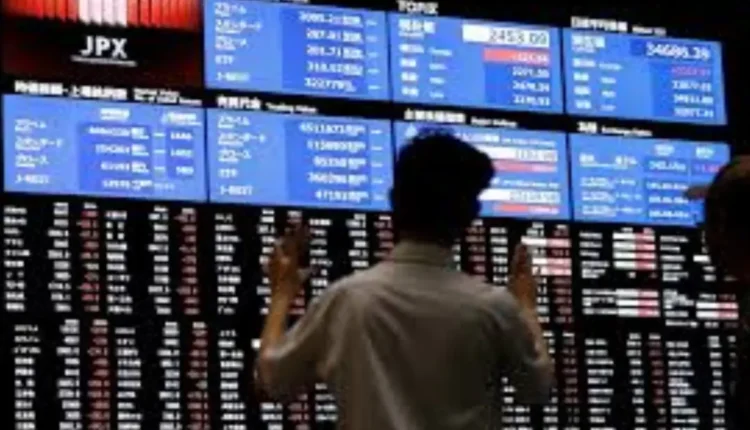Global markets were mixed on Wednesday ahead of the release of the US inflation data, with all eyes on Fed Chair Jerome Powell’s future statements, after he said the bank was not in a rush to adjust its monetary policy yet.
US President Donald Trump’s policy decisions impacted the direction of the global markets, as he imposed 25% tariffs on steel and aluminum imports, feeding the already heated trade war concerns, after he already made executive orders to tariff the US’ major trade partners.
Despite the Fed’s significant progress in the fight against inflation, concerns that Trump’s decisions may give rise to inflationary pressures came to the forefront, as this may narrow the bank’s policy space, further complicating price estimates.
Powell stated that the US economy is generally strong and there has been significant progress to reach the bank’s goals in the last two years, speaking at the Senate’s Banking, Housing, and Urban Affairs Committee on Tuesday, noting that inflation is close to the long-term 2% target but still remains high.
He mentioned that the Federal Open Market Committee cut the policy rate by 100 basis points since September 2024, emphasizing that the decision was appropriate due to the progress already made in reducing inflation and the cooling in the labor market.
“With our policy stance now significantly less restrictive than it had been and the economy remaining strong, we do not need to be in a hurry to adjust our policy stance,” he said.
Meanwhile, Cleveland Fed President Beth Hammack said inflation remains high and the rates are unlikely to be cut for a while due to too many upside risks to the inflation outlook, as the 2% target inflation is still not in sight amid ongoing uncertainties over the impact of the Trump administration’s policies.
New York Fed President John Williams stated that the US’ real gross domestic product growth will be around 2% in 2025-26, noting that the economic outlook is highly uncertain due to potential economic, trade, immigration, and other regulatory policies.
At the same time, American steel companies’ shares rose after Trump’s executive order to impose 25% tariffs on steel and aluminum imports. Steel Dynamics shares climbed 1.5%, Nucor 0.4%, Century Aluminum 5.6%, and Alcoa 0.7%, while the shares of Cleveland-Cliffs declined 4.6% on Tuesday despite Monday’s rises.
The US 10-Year Futures bond rose to 4.55% and the US dollar index climbed 0.1% to 108.
As for gold, after breaking consecutive records amid global uncertainties and concerns over trade wars, it reached $2,943 on Tuesday and declined from this figure, balancing at $2,898, down 0.4%.
Brent crude oil fell 0.3% to $76.5 per barrel at the same time.
On the New York Stock Exchange, the Dow Jones rose 0.28%, the Nasdaq fell 0.36%, and the S&P 500 remained on a horizontal course. American index futures started Wednesday on a mixed course.
Meanwhile, a positive course came to the fore in Europe. EU Commission President Ursula von der Leyen announced that the US’ steel and aluminum tariffs will not go unanswered.
“Tariffs are taxes—bad for business, worse for consumers,” she said in a statement, noting that these tariffs will be met with “firm and proportionate countermeasures” to safeguard the EU’s economic interests.
The first contact between the EU and the Trump administration was made at the Artificial Intelligence (AI) Action Summit in Paris on Monday and Tuesday, during which von der Leyen and US Vice President JD Vance held a meeting.
At the same time, Germany recorded a trade surplus of €70 billion ($72.5 billion) with the US in 2024.
On Tuesday, the DAX 40 rose 0.58%, the FTSE 100 0.11%, the FTSE MIB 30 0.81%, and the CAC 40 0.28%, while starting Wednesday on a mixed course.
As for Asia, a buying-heavy course was prominent except for China.
South Korean government said it would retaliate against Trump’s steel and aluminum tariffs.
South Korea’s acting President Choi Sang-mok said on Tuesday that Seoul will respond to Trump’s tariffs with “pre-prepared measures.”
Yoji Mutio, the Japanese minister of economy, trade, and industry, said Tokyo requested Washington to grant Japan an exemption from steel and aluminum tariffs.
Bank of Japan Governor Kazuo Ueda said the impact of Trump’s trade policies needs to be comprehensively assessed before including it in economic forecasts.
Meanwhile, Chinese tech markets attained a newfound and rising interest after the DeepSeek AI model reached prominence, offering performance close to and sometimes outmatching its Western rivals at a much lower cost.
Analysts say that the positive impact of DeepSeek’s breakthrough was felt on Chinese tech stocks, possibly triggering the re-evaluation of Chinese firms on a global scale.
At the same time, the Nikkei 225 gained 0.2% the Kospi Index 0.1%, and the Hang Seng index 1.6%, while the Shanghai Composite Index remained flat.
In Türkiye, the BIST 100 climbed 0.38 points, completing Tuesday at 9,882.79 points.
The US dollar/Turkish lira exchange rate increased 0.1% to 36.0440 on Tuesday, currently trading at 36.0420 on a horizontal course on Wednesday.
Analysts note that the levels of 9,800 and 9,750 are in support, while 9,950 and 10,000 are in the resistance position for the BIST 100.

